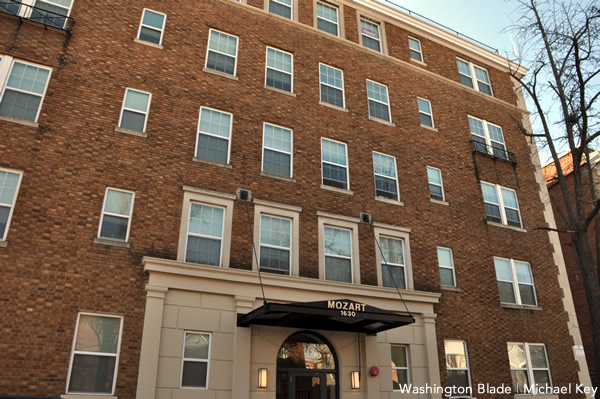Local
Judge upholds murder charge in roommate stabbing case
Wilson charged with second degree murder but maintains his innocence; lawyer says no evidence connects him to crime

A D.C. Superior Court judge on Wednesday ruled that prosecutors demonstrated probable cause exists that David Jamal Wilson, 21, allegedly stabbed his 72-year-old roommate to death in the D.C. apartment they shared.
Police found Howard Venable dead in his apartment at the Mozart Apartments at 1630 Fuller St., N.W. on Feb. 2. The U.S. Attorney’s office charged Wilson with second degree murder while armed on Feb. 4 after D.C. police homicide detectives discovered he used credit cards he allegedly stole from Venable to withdraw more than $600 in cash from ATM machines in District Heights, Md.
During a Feb. 20 preliminary hearing, Judge Stuart Nash ruled that prosecutors provided sufficient evidence to show probable cause and “substantial probability” that Wilson murdered Venable. The ruling clears the case for trial, which is expected to take place later this year.
Shortly after Wilson’s arrest, two sources told the Blade that Venable and Wilson were having an affair and that Venable was providing financial support for Wilson. At Wednesday’s hearing, D.C. police homicide Det. King Watts testified that Wilson and another witness told police that Venable was paying Wilson for sex.
The Washington Post reported that Wilson’s attorney, Jacqueline Cadman, stated at the hearing that Venable and Wilson had been in a longstanding “abusive” sexual relationship since Wilson was a “child.” She called on the court to lower the charge against Wilson to manslaughter because of the abuse, but Nash denied that request, the Post reported.
Assistant U.S. Attorney Holly Schick, the prosecutor in the case, pointed to an autopsy report showing that Venable was stabbed multiple times in the neck and torso and had “defensive” wounds on his hands and arms.
A police arrest affidavit says Wilson initially denied he was staying in the apartment and denied any role in the murder. It says he gave police several conflicting versions of how Venable was killed, including one version that Venable was stabbed by intruders who planned to rob him. The affidavit says Wilson acknowledged Venable had been stabbed before police publicly disclosed the killing involved a stabbing.
In another version, Wilson said he got into a fight with Venable inside the apartment and Venable retrieved a knife from the kitchen and the two struggled before Venable fell and stabbed himself, the affidavit says.
In his ruling, Nash said the autopsy report and other evidence shows the death could not have been caused by Venable accidently stabbing himself.
Cadman argued that police did not present any physical evidence linking Wilson to the murder. She said Wilson gave several versions of what may have happened during a four-hour interrogation session at the police homicide office.
“It is speculation,” she said. “There is no evidence whatsoever that links Mr. Wilson to Mr. Venable’s death.”
She urged Nash to release Wilson from jail while he awaits trial, saying he would not present a risk to the community. She noted that Wilson is married and has three small children, who rely on him for financial support.
Nash declined that request and ordered Wilson held until trial.
Court records show that Wilson’s wife obtained a civil protection order against him in July 2011 after accusing him of assaulting her and presenting what she believed was a threat to their children. Records show the Superior Court’s Domestic Violence Unit issued a stay away order prohibiting Wilson from returning to the home where he and his wife and children had been living.
At Wednesday’s court hearing on the murder charge, defense attorney Cadman said Wilson’s wife was in the courtroom to show her support for him and favored a ruling to allow Wilson’s release on bond.
Judge Nash scheduled a status hearing for May 10.
This story has been updated to reflect that Howard Venable was 72 at the time of his death. D.C. police initially reported that Venable was 68 in a press release in February at the time of the murder, and the Blade reported that age before new information surfaced that Venable was 72.
Virginia
Walkinshaw wins Democratic primary in Va. 11th Congressional District
Special election winner will succeed Gerry Connolly

On Saturday, Fairfax County Supervisor James Walkinshaw won the Democratic primary for the special election that will determine who will represent Virginia’s 11th Congressional District.
The special election is being held following the death of the late Congressman Gerry Connolly, who represented the district from 2008 until 2024, when he announced his retirement, and subsequently passed away from cancer in May.
Walkinshaw is not unknown to Virginia’s 11th District — he has served on the Fairfax County Board of Supervisors since 2020 and had served as Connolly’s chief of staff from 2009 to 2019. Before he passed away, Connolly had endorsed Walkinshaw to take his place, claiming that choosing Walkinshaw to be his chief of staff was “one of the best decisions I ever made.”
The Democratic nominee has run his campaign on mitigating Trump’s “dangerous” agenda of dismantling the federal bureaucracy, which in the district is a major issue as many of the district’s residents are federal employees and contractors.
“I’m honored and humbled to have earned the Democratic nomination for the district I’ve spent my career serving,” Walkinshaw said on X. “This victory was powered by neighbors, volunteers, and supporters who believe in protecting our democracy, defending our freedoms, and delivering for working families.”
In addition to protecting federal workers, Walkinshaw has a long list of progressive priorities — some of which include creating affordable housing, reducing gun violence, expanding immigrant protections, and “advancing equality for all” by adding sexual orientation and gender identity to the Fair Housing Act.
Various democratic PACs contributed more than $2 million to Walkinshaw’s ad campaigns, much of which touted his connection to Connolly.
Walkinshaw will face Republican Stewart Whitson in the special election in September, where he is the likely favorite to win.
Maryland
LGBTQ suicide prevention hotline option is going away. Here’s where else to go in Md.
Changes will take effect July 17

By ANNA RUBENSTEIN | The national suicide prevention hotline will no longer offer specialized support to LGBTQ people, starting July 17, the Trump administration announced last week.
Dialing the hotline at 988 will still be available for crisis support. But callers will no longer be able to reach specific LGBTQ services by pressing Option 3. The change worries advocates because their data shows the LGBTQ community has a disproportionally high suicide rate.
Even after the option ends, here’s how to receive tailored support if you’re in Maryland.
The rest of this article can be found on the Baltimore Banner’s website.
Maryland
Silver Spring holds annual Pride In The Plaza
‘Today means inclusion. It means to build resilience’

Silver Spring’s annual Pride in the Plaza event took place on Sunday to celebrate the LGBTQ community and emphasize inclusion and resilience.
“Today means inclusion. It means to build resilience, love,” Robyn Woods, program and outreach director for Live In Your Truth, which organized the event, said. “I mean, just being surrounded by the community and so many great entrepreneurs, business owners, and just being a part of this whole rainbow coalition that we call the LGBTQIA to be about.”
With the event being her first time organizing for Live In Your Truth, Woods said she felt emotional to see the support and love at the event.
“Some people (are) bringing out their children, their babies, their grandparents,” Woods said. “It’s a lot more allies here than anything else. That type of support to me means so much more than just support from my community; just outside support, inside support, so much support around it, so much love. Everyone’s smiling outside, helping each other.”
Attendees of the event were able to head over to the Family Fun Zone, an air-conditioned Pride Cool Down Lounge, or watch live drag performances in the main stage area.
Along with entertainment and a shaved-ice stand, rows of information tables stood along the plaza, including FreeState Justice, the Washington Spirit, Trans Maryland, Moco Pride Center, and the Heartwood Program, an organization that offers support, therapy, education, and resources to the LGBTQ community.
“I want people to know about our services, and I love what we have to offer,” Jessica Simon, psychotherapist for Heartwood Program’s Gender Wellness Clinic, said. “I (also) want to be part of a celebration with the community, and so it feels good to be here with other people who have something they want to give to the community.”
She added that within today’s political climate, to which she called an “antidote to shame,” it’s important to be celebrating Pride.
“There’s a lot of demonization of LGBTQI people,” Siena Iacuvazzi, facilitator for Maryland Trans Unity, said. “(Pride) is part of the healing process.”
Iacuvazzi said she was taught to be ashamed of who she was growing up, but being a part of a community helped her flourish in the future.
“I was taught how to hate myself. I was taught that I was an abomination to God,” she said. “But being a community is like understanding that there are people who have experienced the same thing, and they’re flourishing. They’re flourishing because they’re willing to stand up for themselves as human beings and discover themselves and understand what’s true for themselves.”
She added that Pride allows for a mutual understanding to take place.
“It’s more of a sense of belonging … and just taking that home and understanding you’re not alone,” Iacuvazzi said. “We’re each taking our own journey — we’re not putting that on each other. It’s just walking away with a sense of belonging and humanity.”
Similar to Iacuvazzi, Woods said she hopes attendees’ biggest takeaways would be family, fun, resilience, and pride.
“Being proud of yourself, being happy for who you are, and representation and how much it matters,” she continued. “And I think all these young people that are walking around here get to see versions of themselves, but older. They get to see so many different lesbian, gay, bisexual, pansexual people that are successful, that are showing love, that care, and it’s not how we’re portrayed in the media. It’s lovely to see it out here. (It’s) like we’re one big old, happy family.”
-

 U.S. Supreme Court5 days ago
U.S. Supreme Court5 days agoSupreme Court upholds ACA rule that makes PrEP, other preventative care free
-

 U.S. Supreme Court5 days ago
U.S. Supreme Court5 days agoSupreme Court rules parents must have option to opt children out of LGBTQ-specific lessons
-

 Television5 days ago
Television5 days ago‘White Lotus,’ ‘Severance,’ ‘Andor’ lead Dorian TV Awards noms
-

 Music & Concerts5 days ago
Music & Concerts5 days agoBerkshire Choral to commemorate Matthew Shepard’s life













